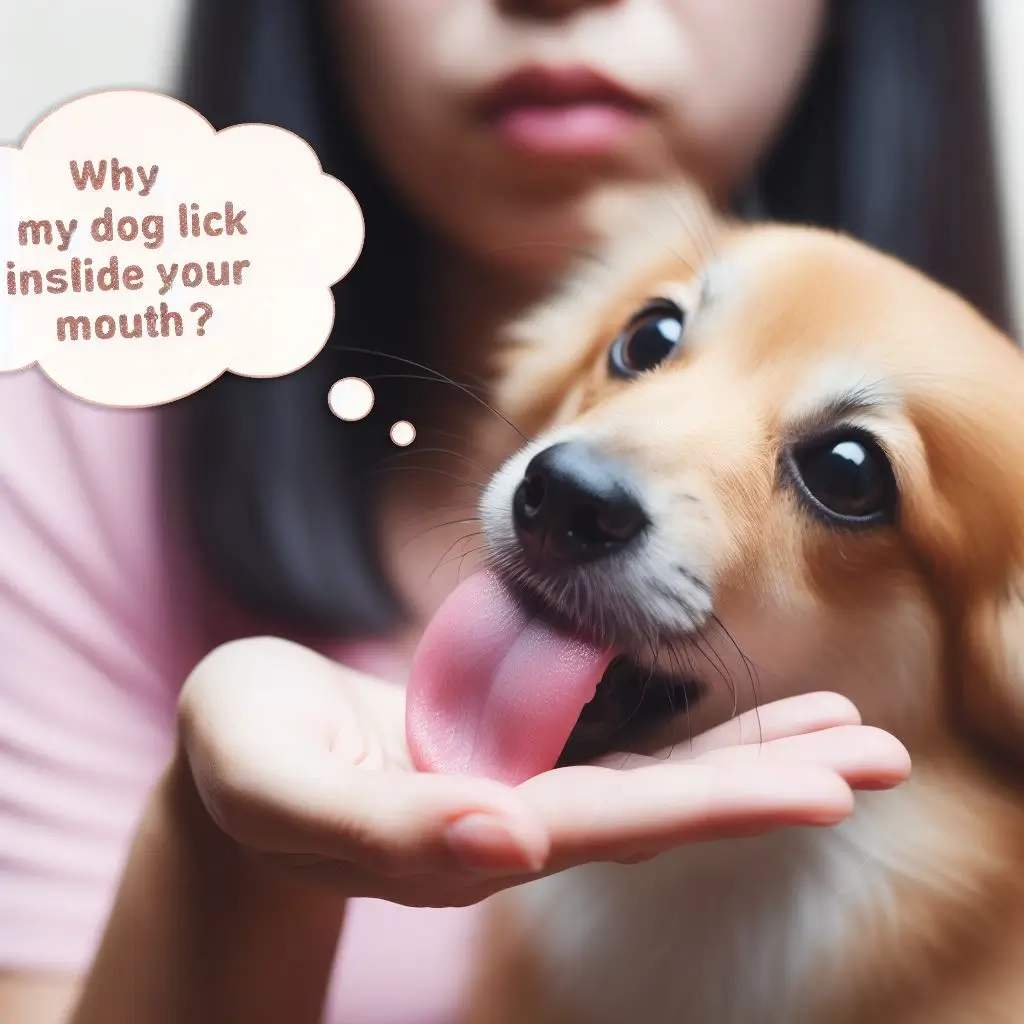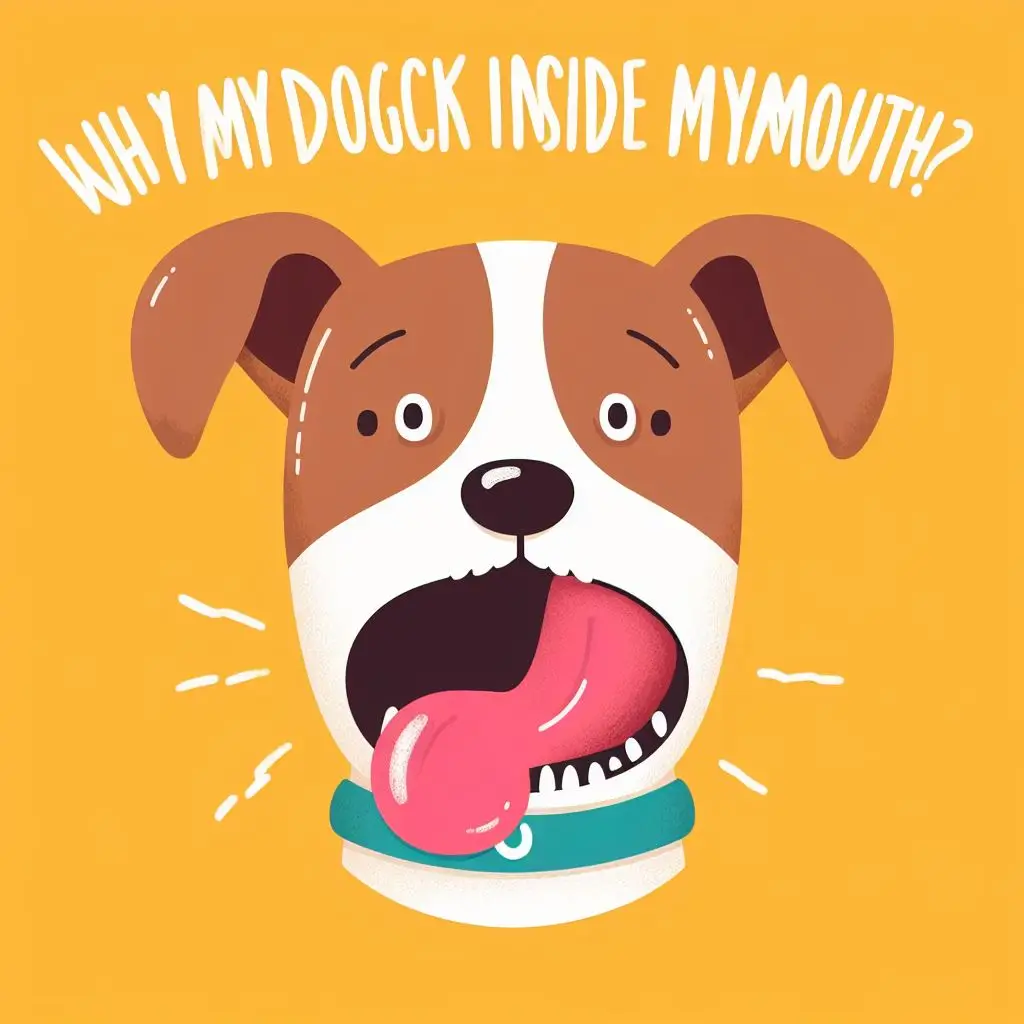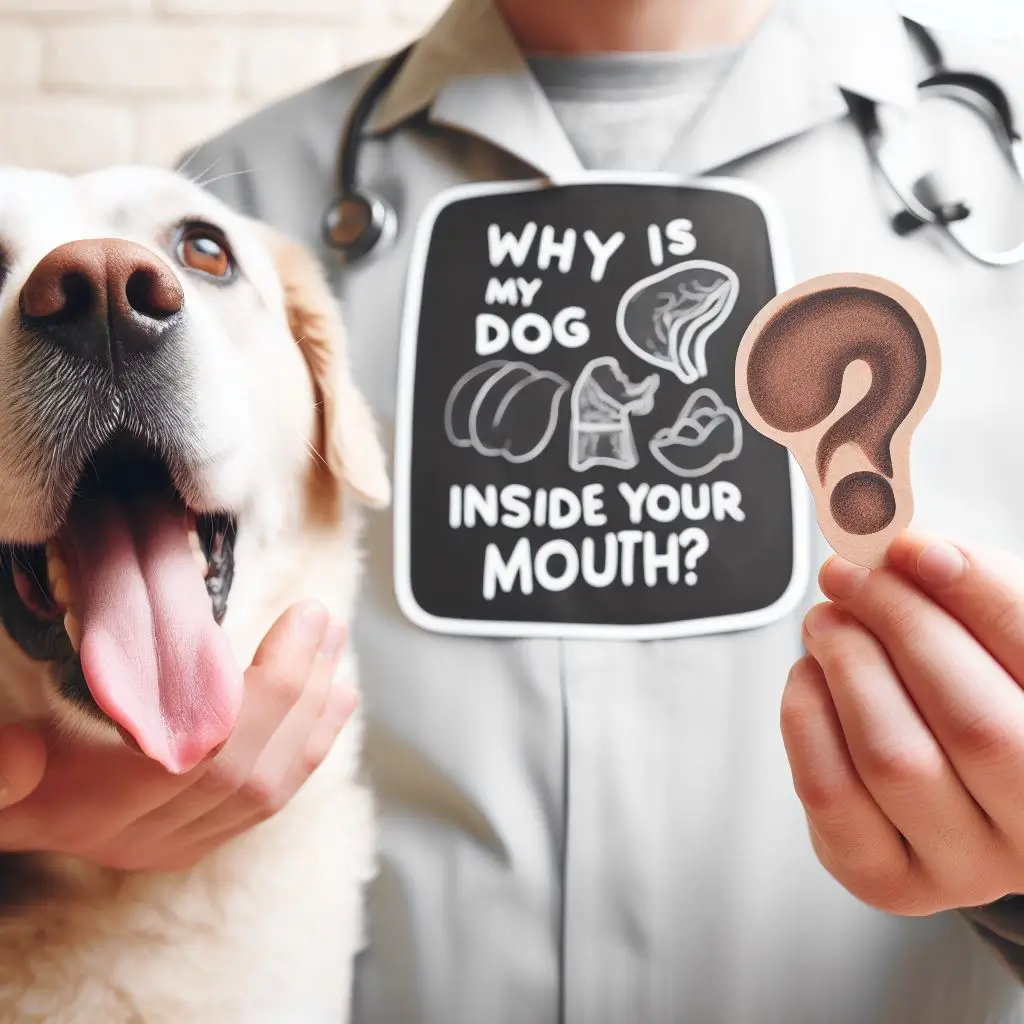Key Takeaways:
| Reasons Dogs Lick Inside Mouths | Risks of Allowing Licking | Tips to Limit Licking |
|---|---|---|
| Showing affection and attachment | Spreading microbes that cause illness | Use “no lick” command and reward when obeyed |
| Displaying submission and trust | Irritation, sores, chapped lips | Distract with chew toys when licking starts |
| Exploring scents and tasting flavors | Ingesting harmful human foods or chemicals | Keep dog’s mouth clean and appealing with dental hygiene |
| Getting your undivided attention | Developing obsessive compulsive licking habit | Wipe face so it doesn’t smell tempting |
| Practicing dental hygiene and grooming | Canine allergies to human saliva | Avoid direct mouth-to-mouth contact |
| Communicating a need or health issue | Monitor dog’s diet to reduce food cravings | |
| Learned habit from owner’s reinforcement |
Dogs have a natural instinct to use their tongues to gather information and interact with their environment. When your pup licks inside your mouth, it may seem gross but it stems from their innate behaviors and desire to communicate with you. Understanding the potential motivations and risks behind this doggy kiss can help you handle it properly.
Why Dogs Lick Inside Your Mouth
Licking inside a human mouth is not a usual canine social behavior, so clearly your dog has some special reasons for this intimate gesture. Here are some of the most common motivations behind this wet sign of affection.
Showing Love and Attachment
Licking is a prime way dogs show affection and emotional attachment. Just like hugging or kissing for humans, your dog is demonstrating their love and bond through mouthing licking. It causes the release of oxytocin in both your bodies for a soothing, happy connection. Puppies learn to associate licking with attachment and comfort through their mothers’ cleaning right from birth.
This innate nurturing behavior often gets passed onto human family members through mouth licking later in life. For your dog, licking the inside of your mouth is the ultimate display of their loving connection and desire to care for you similarly to their parent as a puppy.

Displaying Submission and Trust
Letting their teeth and tongue be exposed so close to your face is also a display of respect and submission. Essentially they are showing you, their powerful pack leader, that they trust you completely and accept your dominance in the relationship. Licking inside your mouth takes this surrender and vulnerability to the next level. They are comfortable being that intimate knowing you won’t harm them in that exposed state. It’s them saying you have full authority over them, even in their most defenseless position with their mouth wide open. Your dog likely feels very secure with your leadership to make themselves so vulnerable.
Exploring Tastes and Scents
Your mouth offers a whole host of aromatic clues for your dog to decipher with their superior sense of smell. Their noses have up to 300 million scent receptors compared to our mere 6 million. By licking inside your mouth, they can gather genetic, food, bacteria, and hormonal information to understand you better on a molecular level. Anything you’ve eaten recently like coffee, salt, spices, meat, etc. can leave appetizing flavors on your lips and saliva.
Your dog’s olfactory investigation helps them recognize you as family and feel closer through these chemical cues. It gives them a wealth of data about your activities and health too. Think of it like an intimate doggy version of getting to know someone by smelling their clothes. Except they are able to process much more complex genetic and biological information than we can comprehend. Your mouth is a font of knowledge for your dog.
Getting Your Undivided Attention
Many dogs learn that putting their snout inside your mouth gets a swift, predictable reaction from their human. You’re guaranteed to stop what you’re doing and pay attention to reprimand them or push them away. This positive reinforcement of interrupting your focus means mouthing behaviors often become attention-seeking habits.
Your dog may have figured out that licking inside your mouth is the ultimate trick to get your eyes on them. Especially if they do it when you’re distracted with another task and not giving them attention. The sensation also arouses you quickly for guaranteed engagement. Soon this becomes their go-to move when they’re bored or lonely and craving your interaction. For dogs that don’t mind the scolding, even negative attention is better than no attention at all.

Practicing Dental Hygiene and Grooming
The enzymes in dog saliva help break down plaque and keep their teeth clean. Their innate dental care instinct extends to you as your dog tries their version of brushing your teeth by licking inside your mouth. The abrasive texture of their tongue can scrape off some buildup like a rudimentary toothbrush against your teeth and gums. It certainly can’t replace proper daily brushing and professional cleanings, but there may be some oral health benefits for you. Consider it your pup looking out for your hygiene based on their own innate cleaning habits. Essentially they are trying to gently groom you as they would another dog. It’s their instinct, even if a bit misguided in application.
Communicating a Need or Health Issue
Increased mouth licking could also be your dog’s attempt to tell you something is wrong. They may feel ill and be seeking comfort and care through licking. It’s a regressive signal to their puppy days of needing nurturing when sick or hurt. Or they might be signaling hunger if they don’t have easy access to food and water at the moment. Like pawing, whining or barking, mouth licking may be the only way your dog knows how to say they need you to do something for them. Pay attention if the licking behavior arises suddenly or increases in frequency. Your dog may just need some TLC or assistance with their basic needs.
An Obsessive Learned Habit
Many owners inadvertently teach their dog to lick inside their mouths by allowing it without correction. They let their guard down because it feels like an affectionate kiss. Your amused reaction further reinforces the behavior as something desirable to your dog. Eventually it becomes an obsessive compulsive habit they feel driven to perform for stimulation and stress relief, the same way dogs compulsively chase tails or lick paws. Well-meaning pet parents often enable these obsessive behaviors accidentally through positive reinforcement like laughter, treats, and affection. While not the dog’s fault, consistently allowing the behavior cements it as an irresistible ritual.
Risks of Dog Licks Inside Your Mouth
While not extremely hazardous in most cases, some risks do accompany letting your dog lick the inside of your mouth. Here are a few health considerations:
- Germs and bacteria: Dog saliva harbors bacteria that while generally safe for them, can cause illness in humans if transmitted in large enough amounts. This includes organisms like Pasteurella, Capnocytophaga, and others that can lead to infections or oral lesions if they overwhelm the immune system. Immunocompromised individuals are at highest risk.
- Gastrointestinal issues: Certain common dog microbes like giardia, C. difficile, and salmonella can cause diarrhea, vomiting, or other gut problems if ingested by humans. Stomach bugs are not pleasant!
- Irritation and sores: Excessive or forceful licking inside the mouth can cause chapping, irritation, and sores on the lips, gums or tongue. The abrasive texture of their tongue escalates this risk, like sandpaper against your sensitive mucous membranes.
- Toxins: Human foods, drinks, and oral products like mouthwash left in the mouth area can be harmful if consumed by dogs. Licking transfers these to your pet’s system. Xylitol in gum is extremely toxic to dogs for example.
- Allergies: Saliva allergies are possible in humans from prolonged exposure to a dog’s dander proteins in their spit. Reactions include itching, swelling, and rashes around the mouth.
For those with weaker immune systems like the elderly, very young, or ill, extra precautions should be taken against zoonotic disease transmission from pet licks. Overall though, the risk is quite low for healthy individuals and dogs with no signs of infection.
Tips for Curbing Excessive Licking
If your pooch’s licking inside your mouth has gotten out of hand, there are effective ways to discourage it:
- Train “no lick” using positive reinforcement: Whenever they start licking, say “no lick” firmly. When they stop, praise and reward with a treat. Be very consistent so they learn mouth licking means they lose their treat.
- Wipe your mouth: Dab off any food, drink, or product residue with a napkin so your mouth doesn’t smell or taste tempting. This removes some of the lick appeal.
- Avoid direct contact: Keep your lips sealed when interacting with your dog face-to-face. Show affection by patting or cuddling instead of kissing.
- Use distraction: When you see licking coming, distract them with a toy, command, or high-value treat they can nibble on instead. Redirect the obsession.
- Monitor their diet: Make sure your dog has a balanced diet with all needed nutrients so they don’t crave human foods.
- Prioritize dental health: Regular brushing, professional cleanings, and dental treats help deter mouth fixation and licking urges.
Why Do Dogs Lick Inside Your Mouth?
While being french kissed by your furry friend may seem gross, it comes from a pure place of canine instinct and affection. By understanding your dog’s potential motivations for mouth licking, you can address excessive cases while appreciating sweet kisses that aren’t over the top. With the right balance of training and dental care, you and your dog can both have clean and healthy mouths.
FAQ About Dogs Licking Inside Mouths
Q: Why does my dog want to lick inside my mouth?
A: The most common reasons are to show affection, submission, explore scents/tastes, seek attention, clean teeth, communicate a need, or compulsive habit.
Q: Is it OK to let my dog lick inside my mouth?
A: Occasional licks are low risk for most, but excessive licking can transmit illness or irritate your mouth. Set limits.
Q: What health risks are there from dog licks inside the mouth?
A: Main risks are germs that cause infections, stomach bugs, mouth irritation, ingesting human products, and allergies.
Q: How do I get my dog to stop licking inside mouths?
A: Use positive reinforcement training, distraction, avoiding mouth contact, wiping face, dental care, diet monitoring, and redirecting the obsession.
Q: Does dog saliva have any benefits if licked inside the mouth?
A: Traces of enzymes may provide minor dental cleaning, but not replacement for brushing. Mainly benefits the dog by providing information.
Q: Why does my dog lick my mouth after I eat?
A: Eating makes your mouth a salt and flavor lollipop. Dogs love tasting food residue. Wipe mouth after meals.
Q: What does it mean if my dog suddenly starts licking mouths a lot?
A: It could signal a health/dental problem in the dog, or that something is wrong and they need comfort or care. Vet exam recommended.
Q: Why does my dog lick inside mouths but no one else’s?
A: You likely encouraged and allowed the behavior while others didn’t. Your dog sees you as a special licking exception.
Q: How do I teach my dog to kiss without so much tongue?
A: Accept only gentle lip licks, not deep tongue. Praise and reward lip kissing, and say no with tongue. Stay consistent.
Q: Should I use mouthwash before letting my dog lick inside my mouth?
A: Never let dogs ingest mouthwash, as many ingredients are toxic. Best not to allow inner mouth licking at all.
Hi, I’m John and I love dogs. Ever since I was a kid, I always wanted to have a furry friend by my side. I grew up with a golden retriever named Max, who taught me a lot about loyalty, friendship, and fun. He was my best buddy for 12 years, and I miss him every day.
